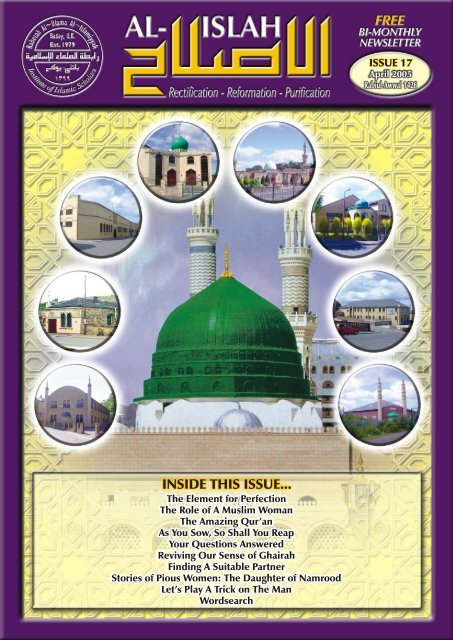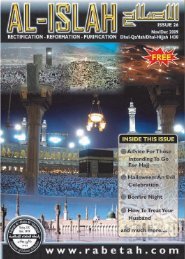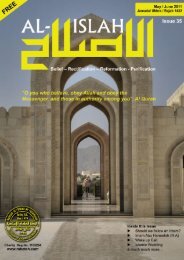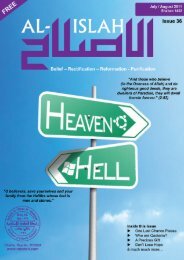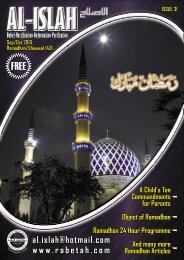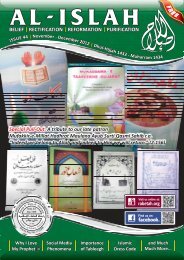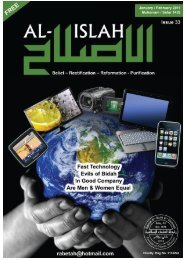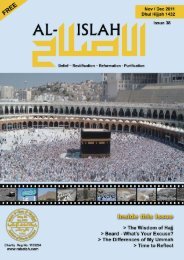the daughter of namrood - Rabetah
the daughter of namrood - Rabetah
the daughter of namrood - Rabetah
- No tags were found...
You also want an ePaper? Increase the reach of your titles
YUMPU automatically turns print PDFs into web optimized ePapers that Google loves.
AL-ISLAH - Issue 17<br />
THE ELEMENT FOR PERFECTION<br />
Maulana Hasib Mayet (d.b.)<br />
The prophetic mission was one which was<br />
orchestrated by <strong>the</strong> Creator <strong>of</strong> <strong>the</strong> universe, <strong>the</strong><br />
Knower <strong>of</strong> all things; Almighty Allah Himself. It rooted<br />
itself from <strong>the</strong> first man and Prophet <strong>of</strong> Allah<br />
Sayyiduna Adam (a.s.) and was concluded by <strong>the</strong><br />
greatest <strong>of</strong> all prophets, our Prophet Muhammad<br />
(s.a.w.). It aimed to save mankind from <strong>the</strong> suicidal<br />
path which it would continuously choose to follow<br />
and deliver <strong>the</strong> most important element, that <strong>of</strong><br />
divine guidance and knowledge without which<br />
perfection could not be reached. For, without divine<br />
guidance and knowledge, it would be impossible to<br />
swim <strong>the</strong> ocean <strong>of</strong> <strong>the</strong> Hereafter and reach <strong>the</strong><br />
shores <strong>of</strong> salvation.<br />
Today, 1400 years from <strong>the</strong> demise <strong>of</strong> our beloved<br />
Prophet (s.a.w.), mankind once again finds itself in<br />
absolute turmoil. Exploring for a solution to its<br />
problems, many seem to have given secular<br />
education <strong>the</strong> role <strong>of</strong> <strong>the</strong> messiah. There is no doubt<br />
that secular education is <strong>of</strong> great importance. It is<br />
in no way condemned by <strong>the</strong> Shari’ah. It has opened<br />
<strong>the</strong> doors <strong>of</strong> great achievements and<br />
advancements, which so many <strong>of</strong> us benefit from<br />
today. It has taught man how to fly high up into <strong>the</strong><br />
sky like a bird and swim deep into <strong>the</strong> ocean like a<br />
fish. But it is only divine knowledge that teaches<br />
man how to walk on <strong>the</strong> earth like a man.<br />
If we have set our objectives only on worldly<br />
achievements without taking into consideration who<br />
we are and what <strong>the</strong> purpose <strong>of</strong> our life is, and not<br />
equip ourselves with divine knowledge and<br />
guidance, <strong>the</strong>n we would be similar to that person<br />
who possesses a briefcase full <strong>of</strong> qualifications but<br />
when shipwrecked realised he had never learned<br />
how to swim. Without this divine element, man will<br />
never be able to find a permanent solution to his<br />
NISAAB OF ZAKAAT<br />
Silver - 52½ Tolas<br />
£74.91<br />
MAHR FATIMI<br />
Silver - 131¼ Tolas<br />
£187.28<br />
(Figures correct at time <strong>of</strong> going to press on 11th April 2005.)<br />
April 2005 / Rabiul-Awwal 1426<br />
CONTENTS<br />
Islamic Teachings ................................... 2 - 3<br />
· A Female Imam?<br />
· My Beliefs and Actions Do Conform to Hadîth !!<br />
Islam & Science ...................................... 4 - 5<br />
· The Amazing Qur’an<br />
· Food for Thought<br />
Spiritual Guidance ................................. 6 - 7<br />
· As You Sow, So Shall You Reap<br />
· From The Pen <strong>of</strong> Faqihul-Ummah<br />
Questions & Answers................................... 8<br />
Current Affairs ............................................. 9<br />
Just for Women ................................... 10 - 11<br />
· Reviving Our Sense <strong>of</strong> Ghairah<br />
· Finding A Suitable Partner<br />
· Stories <strong>of</strong> Pious Women: The Daughter <strong>of</strong> Namrood<br />
Children’s Section ..................................... 12<br />
· Let’s Play A Trick on The Man<br />
· Wordsearch<br />
problems nor gain total success and honour in this<br />
life and <strong>the</strong> next.<br />
Divine knowledge does not aim to teach man <strong>the</strong><br />
science behind <strong>the</strong> universe, but more importantly<br />
teaches man to acknowledge <strong>the</strong> actual unseen<br />
power which allows <strong>the</strong> entire universe to function<br />
so perfectly. To take hold <strong>of</strong> <strong>the</strong> hand <strong>of</strong> a king is far<br />
greater than pocketing a few <strong>of</strong> his priceless<br />
treasures.<br />
Parents and students alike who are hoping to lead<br />
a successful academic career are by all means<br />
encouraged to do so. But, let <strong>the</strong> torch <strong>of</strong> divine<br />
knowledge lead you through <strong>the</strong> corridors <strong>of</strong><br />
scholarship so that you learn not only to serve <strong>the</strong><br />
creation but also its Creator.<br />
Published by:<br />
Al-Islah<br />
<strong>Rabetah</strong> Al-Ulama Al-Islamiyyah (Batley, U.K.)<br />
Institute <strong>of</strong> Islamic Scholars<br />
P.O. Box 7861<br />
Batley<br />
West Yorkshire<br />
WF17 7XE<br />
United Kingdom<br />
www.rabetah.com<br />
Email: al_islah@hotmail.com<br />
Al-Islah contains translation <strong>of</strong> sacred verses <strong>of</strong> <strong>the</strong> Holy Qur’an<br />
and <strong>the</strong> Ahadith <strong>of</strong> <strong>the</strong> Prophet (s.a.w.). Please ensure its sanctity.<br />
1
ISLAMIC TEACHINGS<br />
A FEMALE IMAM?<br />
Mufti Yusuf Sacha (d.b.)<br />
AL-ISLAH - Issue 17<br />
Dr Amina Wadud, a pr<strong>of</strong>essor <strong>of</strong> Islamic Studies at<br />
Virginia Commonwealth University in America, was<br />
<strong>the</strong> first woman to lead a public, mixed-gender<br />
Jumu’ah Salaah in <strong>the</strong> modern day on Friday 18 th<br />
March 2005.<br />
Of <strong>the</strong> evidence provided by those who are<br />
clambering for this is <strong>the</strong> Hadith <strong>of</strong> Umm Waraqah<br />
(r.a.). Abu Dawood reports that Umm Waraqah (r.a.)<br />
said: I said, “O Messenger <strong>of</strong> Allah! Permit for me to<br />
participate in <strong>the</strong> raid with you. I’ll nurse your sick.<br />
Perhaps Allah will grant me martyrdom.” He said,<br />
“Remain in your house for verily Allah will grant you<br />
martyrdom.” And she asked his permission to take a<br />
muadhdhin in her home. And he allowed her. In<br />
ano<strong>the</strong>r version Abu Dawood reports that <strong>the</strong><br />
Messenger <strong>of</strong> Allah used to visit her in her house.<br />
And he assigned to her a muadhdhin who would make<br />
<strong>the</strong> summons (adhaan) to salaah for her. And he<br />
ordered her to lead <strong>the</strong> inhabitants <strong>of</strong> her home.<br />
RESPONSE TO THE ABOVE HADITH<br />
This hadith is also reported by Baihaqi, Daraqutni,<br />
al-Haakim and in <strong>the</strong> Tabaqaat <strong>of</strong> Ibn Sa’d. However,<br />
<strong>the</strong> status <strong>of</strong> this hadith is questioned by scholars <strong>of</strong><br />
hadith because <strong>of</strong> two narrators in its chain <strong>of</strong><br />
transmission. The first is al-Walid ibn Abdullah. Imam<br />
Dhahabi mentions that Ibn Hibbaan had refused to<br />
accept his narrations. Ibn Hajar mentions that al-<br />
Aaqili said that <strong>the</strong>re was inconsistency in his<br />
narrations. If we were to accept his narrations based<br />
on <strong>the</strong> fact that some Muhaddi<strong>the</strong>en, such as Imam<br />
Ahmad and Abu Hatim, have accepted his narrations,<br />
<strong>the</strong> state <strong>of</strong> <strong>the</strong> o<strong>the</strong>r narrator in <strong>the</strong> chain <strong>of</strong> this<br />
hadith, Abdur Rahman, is Majhoolul-Haal (unknown).<br />
In <strong>the</strong> overwhelming majority <strong>of</strong> scholars, <strong>the</strong><br />
existence <strong>of</strong> a narrator whose state is unknown would<br />
make <strong>the</strong> transmission, conveyed by <strong>the</strong> chain, weak.<br />
This combination <strong>of</strong> two potentially weak narrators<br />
makes it questionable to use <strong>the</strong> tradition <strong>of</strong> Umm<br />
Waraqah as <strong>the</strong> basis for establishing any rulings in<br />
<strong>the</strong> divine law.<br />
SECOND EVIDENCE<br />
Ano<strong>the</strong>r important point mentioned as part <strong>of</strong> <strong>the</strong>ir<br />
evidence is that Imam Abu Ja’far Ibn Jarir al-Tabari<br />
held <strong>the</strong> view that a woman could lead salaah in spite<br />
<strong>of</strong> it being a view never accepted by <strong>the</strong> Ummah,<br />
and it has never been witnessed in all <strong>of</strong> Islamic<br />
history.<br />
Imam al-Tabari was an absolute Mujtahid and is<br />
known as <strong>the</strong> Imam <strong>of</strong> <strong>the</strong> Exegetes (Mufassirin). But<br />
his school didn’t thrive and it didn’t last as <strong>the</strong> four<br />
surviving schools did. So his view is extremely<br />
ancient and contradicts what <strong>the</strong> Jamhoor Ummah<br />
unanimously agreed upon in that a woman cannot<br />
lead a man in salaah. Fur<strong>the</strong>rmore, it would be<br />
difficult to know what exactly Imam al-Tabari based<br />
his Ijtihad on today, since his school hasn’t been<br />
preserved with an unbroken chain as <strong>the</strong> four<br />
schools have. So we can’t just accept his individual<br />
opinion as it was an opinion without proper scrutiny<br />
and research.<br />
WHY A FEMALE CANNOT LEAD SALAAH<br />
Rulings pertaining to leadership in salaah are<br />
established by evidence <strong>of</strong> au<strong>the</strong>ntic ahadith as well<br />
as <strong>the</strong> scholarly unanimity <strong>of</strong> Muslims. They are<br />
based on religious teachings and not on social<br />
customs as it has been claimed.<br />
There is unanimous consensus <strong>of</strong> <strong>the</strong> entire Ummah,<br />
in <strong>the</strong> east and west, that women cannot lead <strong>the</strong><br />
Jumu’ah Salaah, nor can <strong>the</strong>y deliver <strong>the</strong> sermon.<br />
Whoever takes part in such a salaah, <strong>the</strong>ir salaah is<br />
nullified. It is never found in any jurisprudential text<br />
<strong>of</strong> Hanafis, Malikis, Shafi‘is or Hanbalis, nor even<br />
from Shi’ite scholars, that a woman can lead <strong>the</strong><br />
Jumu’ah Salaah or deliver <strong>the</strong> sermon. This opinion<br />
(that a woman can lead <strong>the</strong> Jumu’ah Salaah) is an<br />
innovation and a heresy on any account, nullified<br />
by all scholars.<br />
According to <strong>the</strong> Hanafi school <strong>of</strong> thought it is<br />
MY BELIEFS AND ACTIONS DO CONFORM TO HADÎTH !!<br />
13. Du’â to be recited in <strong>the</strong> sitting-posture (Qa’dah)<br />
It is reported by ’Abdullâh ibn Mas’ûd (r.a.) that Rasûlullah (s.a.w.) said: “When one sits in his Salâh he<br />
should read: ‘At-tahîyyâtu lillâhi was-salawâtu wat-tayyibât. As-salâmu ’alayka ayyuhan-nabîyyu<br />
wa rahmatullâhi wa barakâtuh. As-salâmu ’alaynâ wa ’alâ ’ibâdillâhis-sâlihîn. Ash-hadu al-lâ ilâha<br />
illallâhu wa ash-hadu anna Muhammadan ’abduhû wa rasûluh.’”<br />
(Sahîh Bukhârî Vol.1 Pg.115, Sahîh Muslim Vol.1 Pg.173)<br />
2<br />
14. Saying <strong>the</strong> Salâm at <strong>the</strong> end <strong>of</strong> <strong>the</strong> Salâh toge<strong>the</strong>r with <strong>the</strong> Imâm<br />
’Itbân ibn Mâlik (r.a.) relates that at <strong>the</strong> end <strong>of</strong> <strong>the</strong> Salâh, Rasûlullah (s.a.w.) made salâm and we also<br />
made salâm when he made salâm (i.e. simultaneously with him).<br />
(Sahîh Bukhârî Vol.1 Pg.116)
AL-ISLAH - Issue 17<br />
makrooh for a woman to lead o<strong>the</strong>r women in salaah.<br />
However, if she was to do so, <strong>the</strong> salaah would be<br />
valid. Shafi’is and Hanbalis permit a woman to lead<br />
o<strong>the</strong>r women in salaah. But according to all three<br />
Imams <strong>the</strong> validity is on condition that <strong>the</strong> one leading<br />
is not standing out in front <strong>of</strong> <strong>the</strong> row. Ra<strong>the</strong>r, she is<br />
to remain aligned in a single row with <strong>the</strong> o<strong>the</strong>r<br />
women, so as not to appear to be leading as a man<br />
would. As for Imam Malik and <strong>the</strong> popular view held<br />
in <strong>the</strong> Maliki School, any prayer that a woman leads<br />
o<strong>the</strong>rs in, whe<strong>the</strong>r women, men or mixed<br />
congregation, is invalid. Ali ibn Abi Talib (r.a.) is<br />
reported to have said, “The woman is not to lead<br />
(salaah).” This was also <strong>the</strong> view <strong>of</strong> Sulaiman ibn<br />
Yasaar and al-Hasan al-Basari.<br />
In <strong>the</strong> hadith narrated by Anas (r.a.) we learn that<br />
<strong>the</strong> Prophet (s.a.w.) prayed as Imam for Anas (r.a.),<br />
his mo<strong>the</strong>r and his aunt. He made Anas (r.a.) stand<br />
on his right side and Anas’ (r.a.) mo<strong>the</strong>r and his aunt<br />
behind <strong>the</strong>m. The same arrangement was followed<br />
in <strong>the</strong> masjid <strong>of</strong> <strong>the</strong> Prophet (s.a.w.) and across <strong>the</strong><br />
entire Ummah for centuries.<br />
Imam Muslim narrated that <strong>the</strong> Prophet (s.a.w.) said,<br />
“The best rows for <strong>the</strong> men are <strong>the</strong> front ones and<br />
<strong>the</strong> least good are <strong>the</strong> ones towards <strong>the</strong> back; and<br />
<strong>the</strong> best rows for <strong>the</strong> women are <strong>the</strong> ones towards<br />
<strong>the</strong> back and <strong>the</strong> least good are <strong>the</strong> ones towards<br />
<strong>the</strong> front.” This was for no o<strong>the</strong>r reason but to protect<br />
<strong>the</strong>m from any embarrassment and to close <strong>the</strong> door<br />
before any evil thoughts or temptations that might<br />
come into <strong>the</strong> hearts <strong>of</strong> whoever might be looking at<br />
<strong>the</strong>m o<strong>the</strong>rwise. How could it be possible <strong>the</strong>n that a<br />
woman can be in front <strong>of</strong> all rows leading <strong>the</strong> Jumu’ah<br />
Salaah?<br />
It is reported by Ibn Majah that <strong>the</strong> Prophet (s.a.w.)<br />
said, “A woman may not lead a man in prayer, nor<br />
may a Bedouin lead a believer <strong>of</strong> <strong>the</strong> Muhajireen or<br />
a corrupt person lead a committed Muslim in salaah.”<br />
The Prophet (s.a.w.) also warned against <strong>the</strong> same<br />
wrongdoing in <strong>the</strong> hadith which states, “Whoever<br />
innovates in this matter <strong>of</strong> ours (i.e. in our religion)<br />
whatever is not in it, that innovated thing is rejected.”<br />
(Bukhari and Muslim)<br />
The Prophet (s.a.w.) also said, “Beware <strong>of</strong> innovated<br />
matters, for every novelty is perversity.” (Ahmad in<br />
his Musnad and regarded as au<strong>the</strong>ntic). All scholars<br />
are resolved that acts <strong>of</strong> worship are unchangeable<br />
ISLAMIC TEACHINGS<br />
and must be taken exactly as Allah has ordained<br />
<strong>the</strong>m.<br />
None <strong>of</strong> <strong>the</strong> famous pious women ever led <strong>the</strong> jamaat<br />
which included men at <strong>the</strong> back. Sayyidatuna Aishah<br />
(r.a.), Sayyidatuna Umm Salamah (r.a.) and<br />
Sayyidatuna Fatima (r.a.), among many o<strong>the</strong>rs, are<br />
role models for Muslim women. A lot <strong>of</strong> modern day<br />
Muslims, feminists, liberals or whatever o<strong>the</strong>r labels<br />
you have on hand, like to trot out <strong>the</strong> example <strong>of</strong><br />
Sayyidatuna Aishah (r.a.) because she was literate,<br />
quick-witted, intelligent and a trusted counsellor in<br />
many matters. She was a scholar and had a mind <strong>of</strong><br />
<strong>the</strong> highest order. People flocked to her for guidance.<br />
Women should look at her for an example on<br />
imamat. Did Sayyidatuna Aishah (r.a.) ever lead a<br />
jamaat <strong>of</strong> men and women? The answer is no, she<br />
did not. Not while <strong>the</strong> Prophet (s.a.w.) was alive, nor<br />
after he passed away. A hadith found in Baihaqi, as<br />
well as o<strong>the</strong>r collections, relates that Aishah (r.a.)<br />
had led some women in jamaat, but that she stood<br />
in <strong>the</strong> middle <strong>of</strong> <strong>the</strong> row, not in front <strong>of</strong> it. There is a<br />
similar hadith about Umm Salamah (r.a.) in o<strong>the</strong>r<br />
collections. If <strong>the</strong>se women, <strong>the</strong> Mo<strong>the</strong>rs <strong>of</strong> <strong>the</strong><br />
Believers, and <strong>the</strong> best women <strong>of</strong> creation, did not<br />
lead men in salaah, obligatory or non-obligatory, <strong>the</strong>n<br />
why should any o<strong>the</strong>r woman do so?<br />
So we have to understand that this whole issue <strong>of</strong><br />
imamat is from <strong>the</strong> divinely inspired direction <strong>of</strong> <strong>the</strong><br />
Creator. And to contravene it would be to question<br />
His wisdom. And to question His wisdom, would be to<br />
follow in <strong>the</strong> footsteps <strong>of</strong> Shaytaan. And to follow in<br />
<strong>the</strong> footsteps <strong>of</strong> Shaytaan, one is surely to be damned<br />
as he is. So it becomes clear that such people who<br />
insist on <strong>the</strong> permissibility <strong>of</strong> a woman leading men<br />
in salaah have nothing firm to rely on in <strong>the</strong>ir position<br />
o<strong>the</strong>r than <strong>the</strong> following <strong>of</strong> <strong>the</strong>ir fancies and what<br />
<strong>the</strong>ir lusts dictate to <strong>the</strong>m. We know that <strong>the</strong> enemies<br />
<strong>of</strong> Islam have many tactics <strong>the</strong>y use in trying to get a<br />
misdirected and emotional response out <strong>of</strong> <strong>the</strong><br />
Muslims. And perhaps <strong>the</strong>y do that in order to<br />
produce a situation where <strong>the</strong>y can justify taking<br />
action against those <strong>the</strong>y label as extremists,<br />
radicals, terrorists and fundamentalists. I think that<br />
if people want to make up <strong>the</strong>ir own religion, let <strong>the</strong>m<br />
do as <strong>the</strong>y like. We just ask <strong>the</strong>m to give us a little<br />
respect and not call it Islam.<br />
May Allah protect us from those who mislead <strong>the</strong><br />
Ummah from <strong>the</strong> Path <strong>of</strong> Truth. Aameen.<br />
Hadith <strong>of</strong> <strong>the</strong> Month<br />
Rasulullah (s.a.w.) said: “The life <strong>of</strong> <strong>the</strong> world is sweet and green. Allah appointed you<br />
as his vicegerents in it so that He may try you in respect <strong>of</strong> your actions. So beware <strong>of</strong><br />
(<strong>the</strong> attraction <strong>of</strong>) <strong>the</strong> world and (<strong>the</strong> mischief resulting from your unlawful relationship<br />
with) women. The first trial <strong>of</strong> <strong>the</strong> Banu Israel was through women.” [Muslim]<br />
3
ISLAM & SCIENCE AL-ISLAH - Issue 17<br />
THE AMAZING QUR’AN<br />
Gary Miller<br />
Ano<strong>the</strong>r example <strong>of</strong> what one might expect to find<br />
in an “old book” that touches upon <strong>the</strong> subject <strong>of</strong><br />
health or medicine is outdated remedies or cures.<br />
Various historical sources state that <strong>the</strong> Prophet<br />
(s.a.w.) gave some advice about health and hygiene,<br />
yet most <strong>of</strong> <strong>the</strong>se pieces <strong>of</strong> advice are not contained<br />
in <strong>the</strong> Qur’an. At first glance, to <strong>the</strong> non-Muslims<br />
this appears to be a negligent omission. They<br />
cannot understand why Allah would not “include”<br />
such helpful information in <strong>the</strong> Qur’an. Some<br />
Muslims attempt to explain this absence with <strong>the</strong><br />
following argument: “Although <strong>the</strong> Prophet’s (s.a.w.)<br />
advice was sound and applicable to <strong>the</strong> time in<br />
which he lived, Allah, in His infinite wisdom, knew<br />
that <strong>the</strong>re would come later medical and scientific<br />
advances which would make <strong>the</strong> Prophet’s (s.a.w.)<br />
advice appear outdated. When later discoveries<br />
occurred, people might say that such information<br />
contradicted that which <strong>the</strong> Prophet (s.a.w.) had<br />
given. Thus, since Allah would never allow any<br />
opportunity for <strong>the</strong> non-Muslims to claim that <strong>the</strong><br />
Qur’an contradicts itself or <strong>the</strong> teachings <strong>of</strong> <strong>the</strong><br />
Prophet (s.a.w.), He only included in <strong>the</strong> Qur’an<br />
information and examples which could stand <strong>the</strong><br />
test <strong>of</strong> time.”<br />
However, when one examines <strong>the</strong> true realities <strong>of</strong><br />
<strong>the</strong> Qur’an in terms <strong>of</strong> its existence as a divine<br />
revelation, <strong>the</strong> entire matter is quickly brought into<br />
its proper perspective, and <strong>the</strong> error in such<br />
argumentation becomes clear and understandable.<br />
It must be understood that <strong>the</strong> Qur’an is a divine<br />
revelation, and as such, all information in it is <strong>of</strong><br />
divine origin. Allah revealed <strong>the</strong> Qur’an from Himself.<br />
It is <strong>the</strong> words <strong>of</strong> Allah, which existed before<br />
creation, and thus nothing can be added, subtracted<br />
or altered. In essence, <strong>the</strong> Qur’an existed and was<br />
complete before <strong>the</strong> creation <strong>of</strong> Prophet Muhammad<br />
(s.a.w.), so it could not possibly contain any <strong>of</strong> <strong>the</strong><br />
Prophet’s own words or advice. An inclusion <strong>of</strong> such<br />
information would clearly contradict <strong>the</strong> purpose for<br />
which <strong>the</strong> Qur’an exists, compromise its authority<br />
and render it inau<strong>the</strong>ntic as a divine revelation.<br />
Consequently, <strong>the</strong>re was no “home remedies” in<br />
<strong>the</strong> Qur’an which one could claim to be outdated;<br />
nor does it contain any man’s view about what is<br />
beneficial to health, what food is best to eat, or what<br />
will cure this or that disease. In fact, <strong>the</strong> Qur’an<br />
4 only mentions one item dealing with medical<br />
treatment, and it is not in dispute by anyone. It states<br />
that in honey <strong>the</strong>re is healing. And certainly, I do not<br />
think that <strong>the</strong>re is anyone who will argue with that!<br />
If one assumes that <strong>the</strong> Qur’an is <strong>the</strong> product <strong>of</strong> a<br />
man’s mind, <strong>the</strong>n one would expect it to reflect<br />
some <strong>of</strong> what was going on in <strong>the</strong> mind <strong>of</strong> <strong>the</strong> man<br />
who “composed” it. In fact, certain encyclopedias<br />
and various books claim that <strong>the</strong> Qur’an was <strong>the</strong><br />
product <strong>of</strong> hallucinations that Muhammad (s.a.w.)<br />
underwent. If <strong>the</strong>se claims are true - if it indeed<br />
originated from some psychological problems in<br />
Muhammad’s (s.a.w.) mind - <strong>the</strong>n evidence <strong>of</strong> this<br />
would be apparent in <strong>the</strong> Qur’an. Is <strong>the</strong>re such<br />
evidence? In order to determine whe<strong>the</strong>r or not<br />
<strong>the</strong>re is, one must first identify what things would<br />
have been going on in his mind at that time and<br />
<strong>the</strong>n search for <strong>the</strong>se thoughts and reflections in<br />
<strong>the</strong> Qur’an.<br />
It is common knowledge that Muhammad (s.a.w.)<br />
had a very difficult life. All <strong>of</strong> his <strong>daughter</strong>s died<br />
before him except one, and he had a wife <strong>of</strong> several<br />
years who was dear and important to him, who not<br />
only proceeded him in death but at a very critical<br />
period <strong>of</strong> his life. As a matter <strong>of</strong> fact, she must have<br />
been quite a woman because when <strong>the</strong> first<br />
revelation came to him, he ran home to her afraid.<br />
Certainly, even today one would have a hard time<br />
trying to find an Arab who would tell you, “I was so<br />
afraid that I ran home to my wife.” They just aren’t<br />
that way. Yet Muhammad (s.a.w.) felt comfortable<br />
enough with his wife to be able to do that. That’s<br />
how influential and strong woman she was.<br />
Although <strong>the</strong>se examples are only a few <strong>of</strong> <strong>the</strong><br />
subjects that would have been on Muhammad’s<br />
(s.a.w.) mind, <strong>the</strong>y are sufficient in intensity to prove<br />
my point. The Qur’an does not mention any <strong>of</strong> <strong>the</strong>se<br />
things - not <strong>the</strong> death <strong>of</strong> his children, not <strong>the</strong> death<br />
<strong>of</strong> his beloved companion and wife, not his fear <strong>of</strong><br />
<strong>the</strong> initial revelations, which he so beautifully shared<br />
with his wife - nothing; yet, <strong>the</strong>se topics must have<br />
hurt him, bo<strong>the</strong>red him, and caused him pain and<br />
grief during periods <strong>of</strong> his psychological reflections,<br />
<strong>the</strong>n <strong>the</strong>se subjects, as well as o<strong>the</strong>rs, would be<br />
prevalent or at least mentioned throughout.<br />
A truly scientific approach to <strong>the</strong> Qur’an is possible<br />
because <strong>the</strong> Qur’an <strong>of</strong>fers something that is not<br />
<strong>of</strong>fered by o<strong>the</strong>r religious scriptures, in particular,
AL-ISLAH - Issue 17<br />
and o<strong>the</strong>r religions, in general. It is what scientists<br />
demand. Today <strong>the</strong>re are many people who have<br />
ideas and <strong>the</strong>ories about how <strong>the</strong> universe works.<br />
These people are all over <strong>the</strong> place, but <strong>the</strong> scientific<br />
community does not even bo<strong>the</strong>r to listen to <strong>the</strong>m.<br />
This is because within <strong>the</strong> last century <strong>the</strong> scientific<br />
community has demanded a test <strong>of</strong> falsification.<br />
They say, “If you have <strong>the</strong>ory, do not bo<strong>the</strong>r us with<br />
it unless you bring with that <strong>the</strong>ory a way for us to<br />
prove whe<strong>the</strong>r you are wrong or not.”<br />
ISLAM & SCIENCE<br />
that <strong>the</strong>y should not only present what <strong>the</strong>y believe<br />
but should also <strong>of</strong>fer o<strong>the</strong>rs a chance to prove<br />
<strong>the</strong>y’re wrong. However, Islam does that. A perfect<br />
example <strong>of</strong> how Islam provides man with a chance<br />
to verify its au<strong>the</strong>nticity and “prove it wrong” occurs<br />
in <strong>the</strong> 4th chapter. And quite honestly, I was<br />
surprised when I first discovered this challenge. It<br />
states: “Do <strong>the</strong>y not consider <strong>the</strong> Qur’an? Had<br />
it been from any o<strong>the</strong>r than Allah, <strong>the</strong>y would<br />
surely have found <strong>the</strong>rein much discrepancy.”<br />
Such a test was exactly why <strong>the</strong> scientific<br />
community listened to Einstein towards <strong>the</strong><br />
beginning <strong>of</strong> <strong>the</strong> century. He came with a new <strong>the</strong>ory<br />
and said, “I believe <strong>the</strong> universe works like this; and<br />
here are three ways to prove whe<strong>the</strong>r I am wrong!”<br />
So <strong>the</strong> scientific community subjected his <strong>the</strong>ory<br />
to <strong>the</strong> tests, and within six years it passed all three.<br />
Of course, this does not prove that he was great,<br />
but it proves that he deserved to be listened to<br />
because he said, “This is my idea; and if you want<br />
to try to prove me wrong, do this or try that.” This is<br />
exactly what <strong>the</strong> Qur’an has - falsification tests.<br />
Some are old (in that <strong>the</strong>y have already been proven<br />
true), and some still exist today. Basically it states,<br />
“If this book is not what it claims to be, <strong>the</strong>n all you<br />
have to do is this or this or this to prove that it is<br />
false.” Of course, in 1400 years no one has been<br />
able to do “This or this or this,” and thus it is still<br />
considered true and au<strong>the</strong>ntic. I suggest to you that<br />
<strong>the</strong> next time you get into dispute with someone<br />
about Islam and he claims that he has <strong>the</strong> truth<br />
and that you are in darkness, you leave all o<strong>the</strong>r<br />
arguments at first and make this suggestion. Ask<br />
him, “Is <strong>the</strong>re any falsification test in your religion?<br />
Is <strong>the</strong>re anything in your religion that would prove<br />
you are wrong if I could prove to you that it exists -<br />
anything?” Well, I can promise right now that people<br />
will not have anything - no test, no pro<strong>of</strong>, nothing!<br />
This is because <strong>the</strong>y do not carry around <strong>the</strong> idea<br />
FOOD FOR THOUGHT<br />
This is a clear challenge to <strong>the</strong> non-Muslim.<br />
Basically, it invites him to find a mistake. As a matter<br />
<strong>of</strong> fact, <strong>the</strong> seriousness and difficulty <strong>of</strong> <strong>the</strong><br />
challenge aside, <strong>the</strong> actual presentation <strong>of</strong> such a<br />
challenge in <strong>the</strong> first place is not even in human<br />
nature and is inconsistent with man’s personality.<br />
One doesn’t take an exam in school and after<br />
finishing <strong>the</strong> exam, write a note to <strong>the</strong> instructor at<br />
<strong>the</strong> end saying, “This exam is perfect. There are<br />
no mistakes in it. Find one if you can!” One just<br />
doesn’t do that. The teacher would not sleep until<br />
he found a mistake! And yet this is <strong>the</strong> way <strong>the</strong><br />
Qur’an approaches people. Ano<strong>the</strong>r interesting<br />
attitude that exists in <strong>the</strong> Qur’an repeatedly deals<br />
with its advice to <strong>the</strong> reader. The Qur’an informs<br />
that reader about different facts and <strong>the</strong>n gives <strong>the</strong><br />
advice: “If you want to know more about this or that,<br />
or if you doubt what is said, <strong>the</strong>n you should ask<br />
those who have knowledge.” This too is a surprising<br />
attitude. It is not usual to have a book that comes<br />
from someone without training in geography,<br />
botany, biology, etc. who discusses <strong>the</strong>se subjects<br />
and <strong>the</strong>n advises <strong>the</strong> reader to ask men <strong>of</strong><br />
knowledge if he doubts anything.<br />
Yet in every age <strong>the</strong>re have been Muslims who have<br />
followed <strong>the</strong> advice <strong>of</strong> <strong>the</strong> Qur’an and made<br />
surprising discoveries.<br />
(Continued in next issue)<br />
GARLIC: Anas (r.a.) was asked, “What did you hear <strong>the</strong> Prophet (s.a.w.) saying about garlic?”<br />
Anas (r.a.) replied, “Whoever has eaten (garlic) should not approach our Masjid.” (Muslim)<br />
Note: It is Makrooh Tahrimi to enter <strong>the</strong> Masjid with an <strong>of</strong>fensive smell. Rasulullah (s.a.w.) has<br />
prohibited one from entering <strong>the</strong> Masjid after having eaten raw garlic. The angels detest foul smells.<br />
Cigarettes would fall under <strong>the</strong> same ruling.<br />
DUA FOR THE FORGIVENESS OF SINS: The Prophet (s.a.w.) said, “Whoever, after eating,<br />
recites <strong>the</strong> following dua, all his sins will be forgiven: ‘Al-hamdu lillâhil-ladhî at’amanî hâdhatta’âm.<br />
Wa razaqanîhi min ghayri hawlim-minnî wa lâ quwwah.’”<br />
Translation: All praises are due to Allah Who has fed me this food and Who has given it to me<br />
without any effort or striving from my side. (Tirmidhi)<br />
5
SPIRITUAL GUIDANCE<br />
AS YOU SOW, SO SHALL YOU REAP<br />
Muhammad al-Shareef<br />
AL-ISLAH - Issue 17<br />
In a far away land, a long time ago, a boy was born<br />
blind. His widowed mo<strong>the</strong>r – <strong>the</strong> good Muslimah<br />
that she was – did not lose hope in her dua and<br />
pray she did, continuously. A few years later, <strong>the</strong><br />
boy’s sight returned. Alhamdu lillah.<br />
She realized that her village was not befitting for<br />
her son to excel in Islamic education, so with her<br />
son in hand <strong>the</strong>y migrated to Makkah. There she<br />
saw that he was being instructed in Qur’an and<br />
Hadith, <strong>the</strong> latter becoming <strong>the</strong> young man’s focus.<br />
He went out far and wide collecting Hadith and<br />
compiled a Hadith book that sits next to <strong>the</strong> Qur’an<br />
in au<strong>the</strong>nticity, forgetting not his mo<strong>the</strong>r that had<br />
raised him well. His mo<strong>the</strong>r named him Muhammad<br />
ibn Isma’il, and many <strong>of</strong> us know him today as: al-<br />
Imam al-Bukhari!<br />
Dear bro<strong>the</strong>rs and sisters, how <strong>of</strong>ten is it that a<br />
farmer plants wheat and it comes out as a<br />
sunflower? You may say, never! For how can<br />
someone farm <strong>the</strong> seed <strong>of</strong> one plant and expect<br />
some o<strong>the</strong>r plant to grow. It just does not happen.<br />
Similarly, some parents leave <strong>the</strong>ir children<br />
waddling in <strong>the</strong> mud <strong>of</strong> television, music, movies,<br />
and disbelieving friends. Then when <strong>the</strong> child<br />
reaches year 12 and asks to go to <strong>the</strong> final dance<br />
with a girlfriend, or when he enters University and<br />
stops praying, or when he gets married to a Kafir<br />
and himself becomes one, <strong>the</strong>n <strong>the</strong> parents say,<br />
“What happened?”<br />
Bro<strong>the</strong>rs and sisters, it is <strong>the</strong> harvest <strong>of</strong> what we<br />
planted. If we do not raise our children to be<br />
obedient, where do we expect <strong>the</strong>m to learn?<br />
If we do not practice Islam ourselves, who will be<br />
our children’s role-model? How do you teach a child<br />
to wake up for Fajr, when he sees his own fa<strong>the</strong>r<br />
and mo<strong>the</strong>r sleeping in, day after day?<br />
You may ask, how do I raise my children to be good<br />
Muslims, obedient to <strong>the</strong>ir parents?<br />
Consider <strong>the</strong> following:-<br />
Firstly: One should discipline <strong>the</strong>ir children<br />
throughout <strong>the</strong>ir youth. Hisham ibn Abdul-Malik did<br />
not see a son <strong>of</strong> his during Jumu’ah one week.<br />
When he met him later, he asked him, “Why did<br />
you miss Jumu’ah?” His son replied, “My donkey<br />
couldn’t make <strong>the</strong> trip.” His fa<strong>the</strong>r <strong>the</strong>n said,<br />
“Couldn’t you have walked!” For an entire year after<br />
that, Hisham ibn Abdul-Malik made his son walk to<br />
Jumu’ah.<br />
Secondly: The piety <strong>of</strong> <strong>the</strong> fa<strong>the</strong>r and mo<strong>the</strong>r<br />
reaches <strong>the</strong> children. In <strong>the</strong> Qur’an, Allah recalls<br />
for us <strong>the</strong> story <strong>of</strong> Khidr, and how he rebuilt a wall<br />
for two orphans: “And as for <strong>the</strong> wall, it belonged<br />
to two orphan boys in <strong>the</strong> town. Under it was a<br />
treasure belonging to <strong>the</strong>m and <strong>the</strong>ir fa<strong>the</strong>r was<br />
a righteous man…” (Qur’an 18:82) Look at how<br />
Allah protected <strong>the</strong>se orphans because <strong>of</strong> <strong>the</strong> piety<br />
<strong>of</strong> <strong>the</strong>ir fa<strong>the</strong>r. In tafseer, it is said that it was <strong>the</strong>ir<br />
grandfa<strong>the</strong>r seven generations back!<br />
Sa’eed ibn Jubayr (r.a.) said, “I <strong>of</strong>ten leng<strong>the</strong>n my<br />
Salaah for <strong>the</strong> sake <strong>of</strong> my son, perhaps Allah may<br />
protect him (because <strong>of</strong> it).”<br />
In conclusion, let us reflect on <strong>the</strong> virtue <strong>of</strong><br />
respecting our parents:<br />
· It is one <strong>of</strong> <strong>the</strong> greatest things that we can do. In<br />
Bukhari and Muslim, it is narrated from Abdullah<br />
ibn Mas’ud (r.a.), a man asked <strong>the</strong> Prophet (s.a.w.),<br />
“What deed is most beloved to Allah?” He (s.a.w.)<br />
said, “Salaah on time.” The man asked, “And <strong>the</strong>n?”<br />
He (s.a.w.) said, “Respecting and revering one’s<br />
parents.” He said, “And <strong>the</strong>n?” “Jihad for <strong>the</strong> sake<br />
<strong>of</strong> Allah.”<br />
· It is a means by which our sins are forgiven. When<br />
Allah commanded in <strong>the</strong> Qur’an: “And We<br />
enjoined on man to be dutiful and kind to his<br />
parents...” The next verse tells us: “They are<br />
those from whom We shall accept <strong>the</strong> best <strong>of</strong><br />
<strong>the</strong>ir deeds and overlook <strong>the</strong>ir evil deeds, (<strong>the</strong>y<br />
shall be) amongst <strong>the</strong> dwellers <strong>of</strong> Paradise.”<br />
(Qur’an 46:15-16)<br />
· Respecting our parents will lead us to Jannah! In<br />
Muslim, it is narrated from Abu Hurayrah (r.a.): I<br />
heard <strong>the</strong> Messenger <strong>of</strong> Allah (s.a.w.) say, “May he<br />
perish! May he perish! May he perish!” It was asked,<br />
“Who, O’ Messenger <strong>of</strong> Allah?” The Prophet (s.a.w.)<br />
said, “He whose parents attain old age in his life –<br />
6<br />
Dua <strong>of</strong> <strong>the</strong> Month<br />
O Allah! I ask You for guidance, piety, chastity and self-sufficiency.
AL-ISLAH - Issue 17<br />
one or both <strong>of</strong> <strong>the</strong>m – and he does not enter<br />
Paradise (because <strong>of</strong> his goodness towards<br />
<strong>the</strong>m).”<br />
And when our parents are gone, <strong>the</strong> goodness<br />
towards <strong>the</strong>m does not end. Malik ibn Rabi’ah al-<br />
Saa’idi narrated: We were sitting with <strong>the</strong><br />
Messenger <strong>of</strong> Allah (s.a.w.) when an Ansaari man<br />
came and asked, “O’ Messenger <strong>of</strong> Allah, is <strong>the</strong>re<br />
anything left from my Birr (goodness) to my parents<br />
that I should present to <strong>the</strong>m after <strong>the</strong>ir death?” The<br />
Prophet (s.a.w.) said, “Yes, four things: Pray and<br />
ask forgiveness for <strong>the</strong>m. Fulfill <strong>the</strong>ir pledges. Be<br />
kind to <strong>the</strong>ir friends. And maintain <strong>the</strong> ties <strong>of</strong> kinship<br />
that come from only <strong>the</strong>ir direction. That is what is<br />
left from your Birr to <strong>the</strong>m after <strong>the</strong>ir death.” (Ahmad,<br />
Abu Dawood, and Ibn Maajah)<br />
SPIRITUAL GUIDANCE<br />
Aamir ibn Abdullah ibn az-Zubayr (r.a.) said, “My<br />
fa<strong>the</strong>r died, and for an entire year I did not ask Allah<br />
for anything except that He forgive my fa<strong>the</strong>r.”<br />
Remember dear bro<strong>the</strong>rs and sisters, as you meet<br />
your parents today, <strong>the</strong> words <strong>of</strong> Rasulullah (s.a.w.)<br />
“Fa feehima fa jaahid!” i.e. Do Jihaad in (your kind<br />
treatment <strong>of</strong>) your parents.<br />
O’ Allah, forgive us and our parents, and reward<br />
<strong>the</strong>m with <strong>the</strong> finest reward. O’ Allah, elevate <strong>the</strong>ir<br />
position in <strong>the</strong> hereafter and this world; make that<br />
which befalls <strong>the</strong>m an expiation for <strong>the</strong>ir sins and a<br />
means <strong>of</strong> <strong>the</strong>m being closer to you. O’ Allah, grant<br />
<strong>the</strong>m residence in Firdaws, <strong>the</strong> highest level <strong>of</strong><br />
Jannah, with <strong>the</strong> Prophets, <strong>the</strong> Siddeeqeen, and<br />
<strong>the</strong> Martyrs. Aameen.<br />
FROM THE PEN OF FAQIHUL-UMMAH<br />
The sterling advice <strong>of</strong> Faqihul Ummah Mufti Mahmood Hasan Gangohi (r.a.) has helped thousands <strong>of</strong> people to<br />
overcome many problems and difficulties, especially in <strong>the</strong> line <strong>of</strong> Islahun-Nafs (inner-self reformation). Hereunder<br />
is a reply to a letter seeking guidance.<br />
MA’MULAAT (DAILY PRACTICES)<br />
Bismihi Ta’ala<br />
Respected Mufti Sahib<br />
As-Salaamu alaykum wa rahmatullahi wa barakaatuh<br />
I am overcome by laziness. Often I even fall into sin. Whenever I commit any sin, I sincerely<br />
regret it but <strong>the</strong>reafter I find myself entrapped in <strong>the</strong> same sin again. As for my ma’mulaat (daily<br />
practices such as salaah, zikr, tilawat, etc.), at times I complete <strong>the</strong>m all, while at times for<br />
weeks on end I just do not manage to do anything.<br />
Bismihi Ta’ala<br />
Beloved Bro<strong>the</strong>r<br />
As-Salaamu alaykum wa rahmatullahi wa barakaatuh<br />
The practice <strong>of</strong> sometimes completing one’s ma’mulaat and at o<strong>the</strong>r times neglecting <strong>the</strong>m must be<br />
completely refrained from. One cannot progress in this manner. Constancy is absolutely necessary.<br />
According to <strong>the</strong> Hadith, <strong>the</strong> best <strong>of</strong> actions is that upon which one is steadfast. Without this constancy<br />
one cannot achieve <strong>the</strong> islah <strong>of</strong> one’s nafs (<strong>the</strong> purification and reformation <strong>of</strong> <strong>the</strong> inner-self).<br />
As for <strong>the</strong> sins towards which one is inclined, ponder deeply with regards to <strong>the</strong> harms <strong>of</strong> such sins in<br />
this world and <strong>the</strong> punishment in <strong>the</strong> hereafter. Contemplate upon <strong>the</strong> end-result <strong>of</strong> committing such<br />
sins. Insha-Allah, one will be blessed with <strong>the</strong> ability to refrain from <strong>the</strong>m. Also, read about <strong>the</strong> virtues <strong>of</strong><br />
good actions such as salaah, zikr, tilawat, etc. Keep in mind <strong>the</strong> benefits that one will receive from <strong>the</strong>se<br />
actions, both in this world as well as in <strong>the</strong> hereafter. Insha-Allah, you will gain <strong>the</strong> tawfeeq (ability) <strong>of</strong><br />
fulfilling <strong>the</strong>se actions. (Maktoobat Vol.1, Pg.8)<br />
Quote <strong>of</strong> <strong>the</strong> Month<br />
“It is not what you say about someone<br />
when <strong>the</strong>y are dead. It is how you treat<br />
<strong>the</strong>m when <strong>the</strong>y are alive.”<br />
Text Message <strong>of</strong> <strong>the</strong> Month<br />
O Allah let me & da person reading dis b in<br />
ur ocean <strong>of</strong> mercy so dat with every wave<br />
our sins r washed away & let da salts <strong>of</strong><br />
Iman b embedded in our hearts.<br />
7
QUESTIONS & ANSWERS AL-ISLAH - Issue 17<br />
YOUR QUESTIONS ANSWERED<br />
By Mufti Zakariya Akudi (d.b.)<br />
Q. What does <strong>the</strong> Shari’ah say with regard Therefore, <strong>the</strong> external use <strong>of</strong> this type <strong>of</strong> alcohol<br />
to dying hair? Is it permissible to dye one’s is not Haraam. However, its oral intake is still<br />
hair?<br />
impermissible except in <strong>the</strong> cases <strong>of</strong> necessary<br />
medication.<br />
A. To apply pure black dye is not permissible.<br />
Rasulullah (s.a.w.) said, “There will be people Q. Can a female use lipstick or o<strong>the</strong>r<br />
who will come later (in my Ummah) and apply cosmetics and lotions that contain alcohol?<br />
black dye. They will not even smell <strong>the</strong> fragrance<br />
<strong>of</strong> Paradise.” (Abu Dawood)<br />
A. A female may apply make up, etc. on condition<br />
that: a) <strong>the</strong> ingredients are not Haraam, b) a<br />
However, it is permissible for a Mujaahid female does not expose her beauty to non-<br />
(warrior) to apply black dye in order to give <strong>the</strong> Mahrams.<br />
impression <strong>of</strong> being young. (Jawaahirul Fiqh<br />
Vol.2 Pg.421)<br />
The ruling <strong>of</strong> using lipsticks will be <strong>the</strong> same. One<br />
must also remember that if <strong>the</strong> lipstick becomes<br />
It is also permissible for one to dye his/her hair a base on <strong>the</strong> lips to <strong>the</strong> extent that water does<br />
black to beautify himself/herself for one’s not penetrate through that to <strong>the</strong> actual lips, <strong>the</strong>n<br />
marriage partner if he/she is young, and <strong>the</strong> hair <strong>the</strong> Wudhu will be invalid. It is not permissible to<br />
has turned grey due to some sickness, etc. use lotions and cosmetics that contain alcohol<br />
from grapes or date extracts. However, if <strong>the</strong><br />
To dye <strong>the</strong> hair any o<strong>the</strong>r colour besides black alcohol is syn<strong>the</strong>tic, it is pure and permissible.<br />
e.g. Mehndi or Katm (type <strong>of</strong> grass) is<br />
permissible. This was <strong>the</strong> practice <strong>of</strong> Rasulullah Q. Is it permissible for a woman to pluck her<br />
(s.a.w.) and <strong>the</strong> Sahabah (r.a.). (Jawaahirul Fiqh eyebrows?<br />
Vol.2 Pg.421) (Al-Mahmood Vol.1)<br />
A. Mulla Ali Qari (r.a.) has commentated that<br />
It would not be permissible to use a dye which plucking <strong>of</strong> <strong>the</strong> facial hair is Haraam (prohibited)<br />
consists <strong>of</strong> Haraam ingredients.<br />
for a woman with <strong>the</strong> exception <strong>of</strong> moustache or<br />
beard hair, if any woman is unfortunate enough<br />
Q. What is <strong>the</strong> ruling <strong>of</strong> <strong>the</strong> Shariah to be troubled by <strong>the</strong>se. (Mirqaat Vol.8 Pg.295;<br />
regarding <strong>the</strong> use <strong>of</strong> perfumes or Ashrafiyyah)<br />
deodorants containing alcohol? Is it Halaal?<br />
However, if <strong>the</strong> eyebrows have become so<br />
A. The alcohol used in perfumes or deodorants dense that it is unseemly for a woman and incites<br />
is normally a syn<strong>the</strong>tic alcohol, which is not abhorrence in her husband, it is permissible to<br />
impure (najis) according to <strong>the</strong> prevailing view trim it to a more appropriate and normal size.<br />
<strong>of</strong> Imam Abu Hanifah (r.a.) and his followers. (Ahsanul Fataawaa)<br />
If you have any questions regarding <strong>the</strong> beliefs and practices <strong>of</strong> <strong>the</strong> Shari’ah or you are unsure <strong>of</strong> <strong>the</strong> Islamic<br />
perspective on any issue you have come across in <strong>the</strong> media or in any o<strong>the</strong>r literature <strong>the</strong>n please write to:<br />
Al-Islah Q & A, P.O. Box 7861, Batley, West Yorkshire, WF17 7XE or email: al_islah@hotmail.com<br />
Ayah <strong>of</strong> <strong>the</strong> Month<br />
Almighty Allah says: “… And whosoever fears Allah, He will make a way for him to get<br />
out (from every difficulty). And He will provide him from (sources) he never could imagine.<br />
And whosoever puts his trust in Allah, <strong>the</strong>n He will suffice him...”<br />
8 [Qur’an 65:2-3]
AL-ISLAH - Issue 17<br />
CURRENT AFFAIRS<br />
OUR ROLE, OUR DUTY: GENERAL ELECTION 5 MAY 2005<br />
Courtesy <strong>of</strong> Batley Muslim Association (www.batleymuslimassociation.org.uk)<br />
GENERAL OVERVIEW<br />
The general election is round <strong>the</strong> corner. The 24-<br />
hour news channels and <strong>the</strong> press will be giving<br />
more time, ink and paper to <strong>the</strong> coming election.<br />
Unfortunately, some people do not seem to<br />
understand <strong>the</strong> importance and significance <strong>of</strong> <strong>the</strong>se<br />
elections. By ignoring we are being negligent and<br />
failing to perform our righteous duty.<br />
Allah has commanded in <strong>the</strong> Qur’an, “And shun<br />
<strong>the</strong> word that is false.” (Qu’an 22:30)<br />
He guides us fur<strong>the</strong>r, “O you who believe! Stand<br />
out firmly for Allah and be just witnesses. And<br />
let not <strong>the</strong> enmity and hatred <strong>of</strong> o<strong>the</strong>rs make you<br />
avoid justice. Be just: that is nearer to piety, and<br />
fear Allah. Verily, Allah is well-acquainted with<br />
what you do.” (Qur’an 5:8)<br />
The Almighty also says, “Whoever recommends<br />
and helps a good cause becomes a partner<br />
<strong>the</strong>rein: And whoever recommends and helps an<br />
evil cause, shares in its burden: And Allah hath<br />
power over all things.” (Qur’an 4:85)<br />
If one sees open oppression and transgression, and<br />
despite having <strong>the</strong> capability <strong>of</strong> preventing this<br />
oppression by giving <strong>the</strong>ir vote and still <strong>the</strong>y stay<br />
away, <strong>the</strong>n in <strong>the</strong> light <strong>of</strong> Hadith <strong>the</strong>y will be held<br />
accountable. In a Hadith, we are told, “Whoever from<br />
amongst you witnesses a wrong-doing <strong>the</strong>n he must<br />
(act and) try to bring a change with his hand; if,<br />
however, he is unable to do so, <strong>the</strong>n (try to bring a<br />
change) with his tongue (through speech); if he (still)<br />
remains unable, <strong>the</strong>n he should think bad <strong>of</strong> it at<br />
heart, and this is <strong>the</strong> weakest form <strong>of</strong> Faith.” (Muslim)<br />
WHAT SHOULD WE DO?<br />
1. Make sure that every person above 18 is<br />
registered to vote.<br />
2. Try to meet and speak to all candidates in your<br />
constituency.<br />
3. Collectively as a community try to back only one<br />
candidate who favours justice, fairness and<br />
equality.<br />
4. Try to support <strong>the</strong> best candidate in his/her<br />
campaign.<br />
5. Make sure that “differences <strong>of</strong> opinion” are<br />
respected according to <strong>the</strong> teachings <strong>of</strong> Islam.<br />
You can pass comments sincerely and act by<br />
voting.<br />
WHO SHOULD WE VOTE FOR?<br />
• Some constituencies are fortunate to have MPs<br />
who have always voted against injustices,<br />
oppression and unjust wars. They even have, for<br />
<strong>the</strong> sake <strong>of</strong> humanity and conscience, voted<br />
against <strong>the</strong>ir own parties. These people should<br />
retain your support.<br />
• A sincere Muslim candidate must be supported<br />
irrespective <strong>of</strong> <strong>the</strong> party he/she is standing for.<br />
QUESTION: What are we supposed to do in a<br />
situation where we have always received great<br />
support from our local MP on local and international<br />
matters (which is mentioned in <strong>the</strong> first point) and a<br />
Muslim candidate is standing against him/her?<br />
ANSWER: Please determine <strong>the</strong> following sincerely:<br />
a) Both candidates must be spoken to,<br />
b) In some circumstances, it is not necessary that a<br />
Muslim has to vote for a Muslim,<br />
c) Ensure that our vote is not wasted,<br />
d) Ensure that our division does not benefit a third<br />
person.<br />
All <strong>the</strong> above is related to isolated constituencies<br />
and local MPs. However, generally we must try to<br />
support that party and <strong>the</strong>ir candidates who<br />
generally support <strong>the</strong> following:<br />
• In principle, we should prefer a party that has a<br />
“national following” and is adequately<br />
represented in both Houses <strong>of</strong> Parliament, House<br />
<strong>of</strong> Commons and Lords.<br />
• A party that is against draconian laws, which<br />
violates fundamental human rights<br />
• They fully support voluntary aided Faith schools<br />
However, it should be noted that anyone within <strong>the</strong><br />
party who is going against <strong>the</strong> party in <strong>the</strong> above<br />
aspects should not get our unreserved backing.<br />
Through our vote we will Insha-Allah be able to send<br />
out a crucial and clear message that we will never<br />
accept any actions from our leaders and Members<br />
<strong>of</strong> Parliament, which brings oppression and injustice<br />
against o<strong>the</strong>rs in this country and overseas.<br />
Communities and individuals <strong>of</strong> a certain race,<br />
religion and lifestyle must never be discriminated<br />
against. We expect <strong>the</strong>m to serve and represent <strong>the</strong><br />
nation with justice, sincerity and compassion not with<br />
aggression, arrogance and ulterior motives.<br />
USE YOUR VOTE: To learn more about how to raise your concerns in <strong>the</strong> next General Election,<br />
please visit <strong>the</strong> Muslim Council <strong>of</strong> Britain’s website at www.mcb.org.uk/vote2005<br />
JOIN BMA’S FREE MAILING LIST AND RECEIVE REGULAR EMAIL UPDATES<br />
ON ISSUES CONCERNING MUSLIMS IN THE UK.<br />
PLEASE EMAIL: info@batleymuslimassociation.org.uk<br />
9
JUST FOR WOMEN AL-ISLAH - Issue 17<br />
REVIVING OUR SENSE OF GHAIRAH<br />
Fatima Barakatullah<br />
We live in societies in which most men and women<br />
have lost <strong>the</strong>ir sense <strong>of</strong> modesty. Women are<br />
obsessed with <strong>the</strong>ir appearances and wear clo<strong>the</strong>s<br />
to be seen by o<strong>the</strong>rs and to attract <strong>the</strong> attention <strong>of</strong><br />
o<strong>the</strong>r men even if <strong>the</strong>y are married! They have lost<br />
<strong>the</strong>ir sense <strong>of</strong> shame. Marriage is <strong>of</strong>ten looked upon<br />
as old-fashioned and short term affairs and frivolous<br />
relationships are <strong>the</strong> custom; everyone waiting to<br />
attract a better partner and feeling totally justified<br />
to dump one partner for ano<strong>the</strong>r at <strong>the</strong> drop <strong>of</strong> a<br />
hat. Feminism too has reached its peak and men<br />
and women are told to suppress <strong>the</strong>ir natural<br />
emotions. Men are not even embarrassed when<br />
<strong>the</strong>ir wives are dressed up and attract <strong>the</strong> attention<br />
<strong>of</strong> o<strong>the</strong>r men. They don’t mind if ano<strong>the</strong>r man sees,<br />
chats, laughs and even dances with <strong>the</strong>ir womenfolk,<br />
and if <strong>the</strong>y do mind <strong>the</strong>y are told not to be so<br />
possessive.<br />
In Islam, we have a concept <strong>of</strong> Ghairah. Ghairah is<br />
an Arabic word, which means protectiveness or<br />
jealousy. It is a good type <strong>of</strong> jealousy, like when a<br />
man feels jealous or protective over his wife or<br />
sisters and o<strong>the</strong>r women-folk, and doesn’t like o<strong>the</strong>r<br />
men to look at <strong>the</strong>m. It is a natural inbuilt feeling<br />
that Allah has given to men and women. The<br />
Prophet (s.a.w.) had <strong>the</strong> most Ghairah for his wives<br />
and all <strong>of</strong> <strong>the</strong> companions were known for <strong>the</strong>ir<br />
Ghairah. All Muslim men should have a collective<br />
sense <strong>of</strong> protectiveness for Muslim women as Allah<br />
says in <strong>the</strong> Qur’an, <strong>the</strong> meaning <strong>of</strong> which is: “The<br />
Men are <strong>the</strong> protectors and maintainers <strong>of</strong><br />
women…” (Qur’an 4:34)<br />
AN EXAMPLE OF GHAIRAH<br />
To fur<strong>the</strong>r understand <strong>the</strong> quality <strong>of</strong> Ghairah, we can<br />
look at an incident that Asmaa’ (r.a.) <strong>the</strong> <strong>daughter</strong><br />
<strong>of</strong> Abu Bakr as-Siddeeq (r.a.) and sister <strong>of</strong> ’Aishah<br />
(r.a.) relates about herself. Abu Bakr was a wealthy<br />
merchant and he married his <strong>daughter</strong> Asmaa’ to<br />
<strong>the</strong> great companion az-Zubair ibn al-’Awwaam<br />
(r.a.), who was a very poor man, but a man <strong>of</strong> great<br />
piety and one <strong>of</strong> <strong>the</strong> companions who were<br />
promised Paradise. Asmaa’ relates, “When az-<br />
Zubair married me, he had nei<strong>the</strong>r land nor wealth<br />
nor slave…”, so Asmaa’ had to work very hard<br />
kneading dough, going far <strong>of</strong>f to get water. “And I<br />
used to carry on my head,” she continues, “<strong>the</strong><br />
date-stones from <strong>the</strong> land <strong>of</strong> az-Zubair which Allah’s<br />
Messenger (s.a.w) had endowed him and it was a<br />
distance <strong>of</strong> two miles from Madinah. One day, as I<br />
was carrying <strong>the</strong> date-stones upon my head, I<br />
10 happened to meet Allah’s Messenger (s.a.w.), along<br />
with a group <strong>of</strong> his companions. He called me and<br />
told <strong>the</strong> camel to sit down so that he could make<br />
me ride behind him. I felt shy to go with men and I<br />
remembered az-Zubair and his Ghairah and he was<br />
a man having <strong>the</strong> most Ghairah. The Messenger<br />
<strong>of</strong> Allah (s.a.w.) understood my shyness and left. I<br />
came to az-Zubair and said that <strong>the</strong> Messenger <strong>of</strong><br />
Allah (s.a.w.) met me as I was carrying date-stones<br />
upon my head and <strong>the</strong>re was with him a group <strong>of</strong><br />
his Companions. He told <strong>the</strong> camel to kneel so that<br />
I could mount it, but I felt shy and I remembered<br />
your Ghairah.” So Asmaa’ declined <strong>the</strong> <strong>of</strong>fer made<br />
by <strong>the</strong> Prophet (s.a.w.). Upon this az-Zubair said,<br />
“By Allah, <strong>the</strong> thought <strong>of</strong> you carrying date-stones<br />
upon your head is more severe a burden on me<br />
than you riding with him (s.a.w.).” (Bukhari)<br />
Look at <strong>the</strong> sense <strong>of</strong> dignity and modesty <strong>of</strong> Asmaa’!<br />
See how she felt shy in front <strong>of</strong> men? See how<br />
careful she was about her husband’s feelings? She<br />
knew that her husband had a lot <strong>of</strong> Ghairah so she<br />
didn’t want to upset him by accepting <strong>the</strong> Prophet’s<br />
(s.a.w.) help even though <strong>the</strong> Prophet was <strong>the</strong><br />
purest <strong>of</strong> men and even though it meant bringing<br />
hardship on herself!<br />
And look at az-Zubair (r.a.), even though he had a<br />
lot <strong>of</strong> Ghairah, he didn’t want to inconvenience his<br />
wife. What a beautiful relationship <strong>the</strong>y had!<br />
NURTURING OUR SENSE OF GHAIRAH<br />
Sometimes Muslim women don’t understand when<br />
<strong>the</strong>ir men-folk want <strong>the</strong>m to cover <strong>the</strong>ir faces or if<br />
<strong>the</strong>y ask <strong>the</strong>m to change something about <strong>the</strong> way<br />
<strong>the</strong>y dress or speak in public, thinking that <strong>the</strong> men<br />
are being over-protective. But my dear sisters! If<br />
your husband asks you to cover your face, by Allah,<br />
be thankful! Be proud <strong>of</strong> <strong>the</strong> fact that your husband<br />
has a sense <strong>of</strong> Ghairah for you and that he values<br />
you and cares for your hereafter.<br />
He knows what men can be like more than you do<br />
and so never try and suppress his Ghairah in <strong>the</strong>se<br />
types <strong>of</strong> matters. And his concern for you should<br />
incite your own sense <strong>of</strong> honour!<br />
Why should any man be able to see your beauty<br />
and think indecent thoughts about you? We must<br />
nurture our own and our men-folk’s sense <strong>of</strong><br />
Ghairah by behaving and dressing modestly<br />
ourselves and paying attention to <strong>the</strong>ir valid opinions.<br />
We expect certain behaviour from <strong>the</strong>m and <strong>the</strong>y<br />
expect it <strong>of</strong> us. And besides, if our husband asks<br />
us to do something that it not haraam, we must do<br />
it.
AL-ISLAH - Issue 17<br />
And bro<strong>the</strong>rs! How can you allow your wife or sister<br />
to walk around attracting <strong>the</strong> attentions and evilthoughts<br />
<strong>of</strong> o<strong>the</strong>r men? How can you not mind, if<br />
she smiles as she talks to o<strong>the</strong>r men. Nobody has<br />
<strong>the</strong> right to enjoy her and her company but you and<br />
her Mahram men. You are not being overbearing, if<br />
you first encourage and <strong>the</strong>n enforce <strong>the</strong> hijab on<br />
your women-folk because YOU will be asked about<br />
it on <strong>the</strong> Day <strong>of</strong> Judgment and it is also a major sin<br />
upon YOU! It is upon <strong>the</strong> men to enforce <strong>the</strong>se<br />
things in <strong>the</strong>ir homes and you cannot use <strong>the</strong><br />
excuse that your wife didn’t want to. Women need<br />
a firm, balanced, guiding hand from <strong>the</strong>ir men, so<br />
with wisdom you must enforce hijab in your home.<br />
JUST FOR WOMEN<br />
You are a shepherd and are responsible for your<br />
flock!<br />
Allah reminds us all in <strong>the</strong> Qur’an, <strong>the</strong> meaning <strong>of</strong><br />
which is: “O Believers! Protect yourselves and<br />
your families from a fire whose fuel is men and<br />
stones.” (Qur’an 66:6)<br />
There is a big difference between how Islam values<br />
and protects women and how cheaply women are<br />
treated outside <strong>of</strong> Islam! As Muslims we have to be<br />
careful that our Hayaa’ (sense <strong>of</strong> modesty and<br />
shame) and Ghairah don’t wear out in a society in<br />
which people have lost it.<br />
FINDING A SUITABLE PARTNER<br />
Mufti Moosa Badat (d.b.)<br />
As in <strong>the</strong> case <strong>of</strong> choosing a girl, <strong>the</strong> element <strong>of</strong><br />
religious likings and good character must also be<br />
<strong>the</strong> criteria for selection <strong>of</strong> a boy. As narrated in a<br />
Hadith: “Get your <strong>daughter</strong> married with such a boy<br />
from whom you receive a proposal and you are<br />
fully satisfied with his character and religious<br />
attitude. O<strong>the</strong>rwise <strong>the</strong>re will be a widespread <strong>of</strong><br />
evil and vice on <strong>the</strong> earth.” Some Sahabah (r.a.)<br />
asked, “O’ Prophet <strong>of</strong> Allah (s.a.w.), should we <strong>of</strong>fer<br />
our <strong>daughter</strong> even if something is lacking?” (i.e.<br />
Wealth or nobility.) The Prophet (s.a.w.)<br />
emphasized three times, “Yes, get her married.”<br />
(Tirmidhi)<br />
Now please think about <strong>the</strong> above mentioned<br />
Hadith. How true are <strong>the</strong> words <strong>of</strong> our Prophet<br />
(s.a.w.)? What evil and vice do we notice today by<br />
keeping our <strong>daughter</strong>s waiting for a rich or foreignsettled<br />
bridegroom? Ano<strong>the</strong>r Hadith mentions that<br />
<strong>the</strong> Prophet (s.a.w.) informed Ali (r.a.) that do not<br />
delay in three matters:<br />
1. Salaah, when <strong>the</strong> time has commenced.<br />
2. Janaazah, when it is ready for burial.<br />
3. Marriage, when a suitable husband is available<br />
for an unmarried girl. (Tirmidhi, Aadaabul Janaa’iz)<br />
Moreover, it is reported in ano<strong>the</strong>r Hadith: “A man<br />
who gets his <strong>daughter</strong> married to a sinner<br />
(drunkard, gambler etc.), will be deemed as if he<br />
has broken all relations with his <strong>daughter</strong>.”<br />
(Uswatus-Saliheen)<br />
There is reason to believe that such a tyrant<br />
husband shall tyrannise <strong>the</strong> girl and shall not fulfill<br />
her rights. Hence in such a case, <strong>the</strong> fa<strong>the</strong>r himself<br />
has put <strong>the</strong> <strong>daughter</strong> into miseries and <strong>the</strong>reby cut<br />
out all <strong>the</strong> relations. While clarifying <strong>the</strong> position<br />
regarding choosing a suitable boy, in <strong>the</strong> view <strong>of</strong><br />
<strong>the</strong> modern age, Hakimul-Ummah Hadhrat Thanwi<br />
(r.a.) writes ‘With economic conditions sufficient<br />
to maintain, two o<strong>the</strong>r aspects should be<br />
considered in a boy:<br />
1. The boy is firm in Islamic beliefs beyond doubts.<br />
2. He has a polite nature and is well-behaved.<br />
We can hope from this that he will be able to<br />
maintain his family and <strong>the</strong> respect <strong>of</strong> <strong>the</strong> elders<br />
and learned religious scholars as well. (Ma’asire-<br />
Hakimul-Ummah)<br />
STORIES OF PIOUS WOMEN<br />
Maulana Ashraf Ali Thanwi (r.a.)<br />
THE DAUGHTER OF NAMROOD<br />
Namrood is <strong>the</strong> oppressive king who threw Prophet Ibrahim (a.s.) into <strong>the</strong> fire. His <strong>daughter</strong>, Ru’dhah, was watching<br />
<strong>the</strong> scene from above. She noticed that <strong>the</strong> fire was having no effect on Ibrahim (a.s.). She shouted and asked him<br />
<strong>the</strong> reason for this. Ibrahim (a.s.) replied, “Allah has saved me from this calamity through <strong>the</strong> blessing <strong>of</strong> Imaan.”<br />
She said, “If you permit me, I will also come into <strong>the</strong> fire.” He replied, “Recite this Kalimah: ‘There is none worthy <strong>of</strong><br />
worship except Allah and Ibrahim (a.s.) is <strong>the</strong> Khaleel (close friend) <strong>of</strong> Allah’.” She recited this Kalimah and immediately<br />
dived into <strong>the</strong> fire. The fire had no effect on her as well. She <strong>the</strong>n came out <strong>of</strong> <strong>the</strong> fire and rebuked and condemned<br />
her fa<strong>the</strong>r. He subjected her to great difficulties but she remained steadfast on her Imaan.<br />
Lesson: Glory be to Allah! How courageous she was that she did not abandon her Imaan even when in difficulty. O’<br />
women! You should also be steadfast at <strong>the</strong> time <strong>of</strong> difficulties and not go against <strong>the</strong> Deen.<br />
11
CHILDREN’S SECTION<br />
AL-ISLAH - Issue 17<br />
12<br />
Winners <strong>of</strong> last issue’s Quiz Time. CONGRATULATIONS!<br />
1 st PRIZE: Fatima Lambat (Age: 9), 8 Banks Street, Mount Pleasant, Batley<br />
2 nd PRIZE: Aamir Barber (Age: 12), 8 Mount Avenue, Batley<br />
3 rd PRIZE: Maryam Loonat (Age: 8), 55A Dark Lane, Batley<br />
LET’S PLAY A TRICK ON THE MAN<br />
W O R D S E A R C H<br />
You should<br />
receive your prizes<br />
very soon!<br />
A young man, a student in one <strong>of</strong> <strong>the</strong> universities, was one day taking a walk with a pr<strong>of</strong>essor, who was commonly<br />
called <strong>the</strong> student’s friend, because <strong>of</strong> his kindness to those who waited on his instructions. As <strong>the</strong>y went along <strong>the</strong>y<br />
saw, lying in <strong>the</strong> path, a pair <strong>of</strong> old shoes, which <strong>the</strong>y supposed to belong to a poor man who was employed in a field<br />
close by, and who had nearly finished his day’s work. The student turned to <strong>the</strong> pr<strong>of</strong>essor, saying, “Let’s play <strong>the</strong> man<br />
a trick: we will hide his shoes, and hide ourselves behind those bushes, and wait to see his frustration when he cannot<br />
find <strong>the</strong>m.” “My young friend,” answered <strong>the</strong> pr<strong>of</strong>essor, “we should never please ourselves at <strong>the</strong> expense <strong>of</strong> <strong>the</strong> poor.<br />
But you are rich, and may give yourself a much greater pleasure by means <strong>of</strong> this poor man. Put a coin in each shoe,<br />
and <strong>the</strong>n we will hide ourselves and watch how this affects him.”<br />
The student did so and <strong>the</strong>y both placed <strong>the</strong>mselves behind <strong>the</strong> bushes close by. The poor man soon finished his work,<br />
and came across <strong>the</strong> field to <strong>the</strong> path where he had left his coat and shoes. While putting on his coat he slipped his foot<br />
into one <strong>of</strong> his shoes, but feeling something hard, he stooped down to feel what it was, and found <strong>the</strong> coin. Astonishment<br />
and wonder were seen upon his face. He gazed upon <strong>the</strong> coin, turned it around, and looked at it again and again. He<br />
<strong>the</strong>n looked around him on all sides, but no person was to be seen. He now put <strong>the</strong> money into his pocket, and<br />
continued to put on <strong>the</strong> o<strong>the</strong>r shoe; but his surprise was doubled on finding <strong>the</strong> o<strong>the</strong>r coin. His feelings overcame him;<br />
he fell upon his knees, looked up to heaven and cried aloud a heartfelt prayer in which he spoke <strong>of</strong> his wife who was sick<br />
and helpless, and his children without bread, whom this timely gift, from some unknown hand, would save from perishing.<br />
The student stood <strong>the</strong>re deeply affected, and his eyes filled with tears. “Now,” said <strong>the</strong> pr<strong>of</strong>essor, “are you not much<br />
better pleased than if you had played your intended trick?” The youth replied, “You have taught me a lesson which I will<br />
never forget. I feel now <strong>the</strong> truth <strong>of</strong> <strong>the</strong>se words, which I never understood before: It’s more blessed to give than to<br />
receive.”<br />
’Abdullah bin ’Abbas (r.a.) reported that <strong>the</strong> Prophet (s.a.w.) said “Encouraging good, prohibiting evil, lifting <strong>the</strong> burden<br />
<strong>of</strong> <strong>the</strong> weak person and removing an <strong>of</strong>fensive thing from a path are all acceptable prayers to Allah.” (Ibn Maajah)<br />
www.everymuslim.com<br />
A B D U L A B D U L L A H I M<br />
Z A I N A B B I N T J A H S H<br />
A U M M E S A L A M A H A I M<br />
I M O O H T L U K E M M U B A<br />
N U M M E K U L S O O M A R I<br />
A M A A Z U M A R X M A U A M<br />
B A I I A L M P B I M Q M H O<br />
B I S M I S E I H I U J M I O<br />
I M H S N O B A N R C T E W N<br />
N U A A S A R A K H A D H J A<br />
T N H U H B H A M I N V A X H<br />
K H A D I J A T U L K U B R A<br />
H R F A T I M S H M H M I A I<br />
U I A H A F S A H I A M B S R<br />
Z A I N A B Y F A T M E A F I<br />
A W S A F Y A I B A I S H A A<br />
I U H Q A S S Y I F T A W H W<br />
M J A Q S F I Y A H A L I N U<br />
A P U M E S S A Q S F M S I J<br />
H R M A R I A H A I D A A M S<br />
C Z Q A S I M X D A F H Q A T<br />
Wives <strong>of</strong> Prophet<br />
Muhammad (s.a.w.)<br />
Khadijatul Kubra<br />
Saudah<br />
Aishah<br />
Hafsah<br />
Zainab Bint Khuzaimah<br />
Umme Salamah<br />
Zainab Bint Jahsh<br />
Juwairiah<br />
Umme Habibah<br />
Safiyyah<br />
Maimoonah<br />
Daughters <strong>of</strong> Prophet<br />
Muhammad (s.a.w.)<br />
Zainab<br />
Ruqayyah<br />
Umme Kulthoom<br />
Fatimah<br />
Sons <strong>of</strong> Prophet<br />
Muhammad (s.a.w.)<br />
Abdullah<br />
Qasim<br />
Ibrahim<br />
Find The Missing Name<br />
in <strong>the</strong> Wordsearch…….<br />
CLUE: Name <strong>of</strong> Prophet<br />
Muhammad’s (s.a.w.)<br />
mo<strong>the</strong>r?<br />
Entries must be received before 8th May 2005.<br />
Send your entry to: Al-Islah Wordsearch, P.O. Box 7861, Batley, West Yorkshire, WF17 7XE or email: al_islah@hotmail.com<br />
Names <strong>of</strong> prize-winners will be published in <strong>the</strong> next issue <strong>of</strong> AL-ISLAH. SO DON’T FORGET TO INCLUDE YOUR NAME, AGE<br />
AND ADDRESS. AGE LIMIT: 10<br />
1 st PRIZE: £10 Argos Voucher from Batley MSPO<br />
2 nd PRIZE: £5 Voucher from The Three Chef’s<br />
3 rd PRIZE: Barkati Bag from Shafak Promotional Products<br />
(Contents include: Colouring Book, Crayons, Pen plus a Special Gift)
FOR MORE INFO CALL NOW ON<br />
01924 441579 or 01924 477783<br />
Mob: 07779 928027<br />
Caterers Est. 1999


